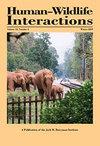COVID-19的挑战:人畜共患疾病和野生动物
IF 0.9
4区 环境科学与生态学
Q4 BIODIVERSITY CONSERVATION
引用次数: 5
摘要
COVID-19对整个地球的深远影响已经动员了许多呼吁,以防止未来发生类似的大流行。呼吁的范围从倡导永久关闭可能出售野生动物的市场,到禁止所有野生动物的商业用途,再到大力加强所有食品价值链的卫生措施和监测。在这份文件中,可持续野生动物管理合作伙伴关系(CPW)的成员提出了四项指导原则,以帮助从业者和决策者做出切实可行的科学回应。这些原则旨在减少未来源自野生动物的流行病的风险,同时加强野生动物的保护,同时尊重不同人群的生计、粮食安全和文化。CPW促进对野生动物与人类之间复杂的相互联系和相互依赖的综合理解,并致力于加强其成员和合作伙伴之间在可持续野生动物管理问题上的合作与协调。粮农组织林业司自2013年起担任保护野生动物委员会秘书处,并作为伙伴关系的积极成员积极参与保护野生动物委员会的一系列举措。本文章由计算机程序翻译,如有差异,请以英文原文为准。
The COVID-19 challenge: Zoonotic diseases and wildlife
The far-reaching impacts of COVID-19 on the entire planet have mobilized numerous calls to prevent similar pandemics in the future. Appeals have ranged from advocacy for the permanent closure of markets where wild animals may be sold, to banning all commercial use of wildlife, to significantly stepping up sanitary measures and monitoring along all food value chains. In this document, the Members of the Collaborative Partnership on Sustainable Wildlife Management (CPW) propose four guiding principles to assist practitioners and decision-makers in making practical and scientifically informed responses. These principles aim to reduce the risk of future pandemics originating from wild animals, at the same time as strengthening the conservation of wildlife whilst respecting livelihoods, food security and culture of diverse groups of people. The CPW promotes an integrated understanding of the complex interconnections and mutual dependencies between wildlife and people and works to increase cooperation and coordination on sustainable wildlife management issues among its members and partners. The FAO Forestry Division has served as the secretariat for the CPW since 2013 and is actively engaged in a wide range of the CPW's initiatives as a proactive member of the Partnership.
求助全文
通过发布文献求助,成功后即可免费获取论文全文。
去求助
来源期刊

Human–Wildlife Interactions
Environmental Science-Nature and Landscape Conservation
CiteScore
2.80
自引率
0.00%
发文量
0
审稿时长
11 weeks
期刊介绍:
Human–Wildlife Interactions (HWI) serves the professional needs of the wildlife biologist and manager in the arena of human–wildlife conflicts/interactions, wildlife damage management, and contemporary wildlife management. The intent of HWI is to publish original contributions on all aspects of contemporary wildlife management and human–wildlife interactions with an emphasis on scientific research and management case studies that identify and report innovative conservation strategies, technologies, tools, and partnerships that can enhance human–wildlife interactions by mitigating human–wildlife conflicts through direct and indirect management of wildlife and increased stakeholder engagement. Our intent is to promote a dialogue among wildlife professionals concerning contemporary management issues. As such, we hope to provide a repository for wildlife management science and case studies that document and share manager experiences and lessons learned.
 求助内容:
求助内容: 应助结果提醒方式:
应助结果提醒方式:


